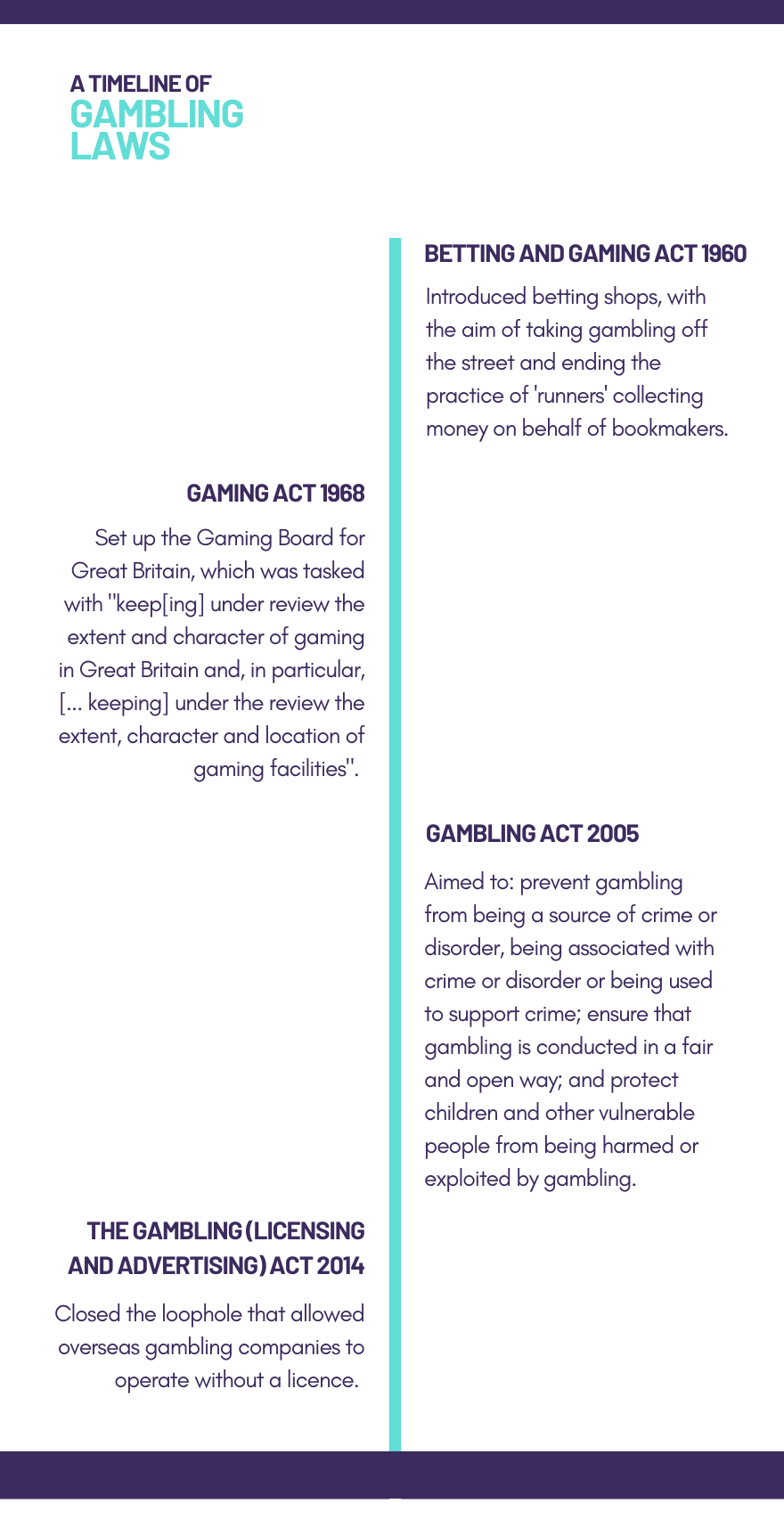With a new government ‘white paper’ on the horizon, Natalie Davies and Rob Calder review the UK’s gambling laws and regulations.
The UK Department for Digital, Culture, Media and Sport (DCMS) launched a review of gambling laws in December 2020, “to look at whether [the] regulatory framework is effective and whether further protections are needed”. The gambling review ran from 8 December 2020 to 31 March 2021, and the government pledged that one of the outcomes of this would be a white paper outlining proposals for future legislation and providing a basis for consultation with stakeholders.

The terms of reference of the review of the Gambling Act 2005 stressed the need to find “an appropriate balance between consumer freedoms and choice on the one hand, and prevention of harm to vulnerable groups and wider communities on the other”.
According to The Guardian, this white paper is due in May 2022. However, at the time of writing (and with only six days left in May), sources suggest that the deadline will probably be pushed into the first or second week of June.
Although it would be tempting to speculate about what the white paper will recommend when it lands on our desks, this article is an attempt to get reacquainted with the scope of gambling laws and regulations to date, potential gaps or flaws in the regulatory framework that the government might seek to ‘plug’ or ‘fix’, and public comments from ministers about the government’s desired direction of travel.
Gambling legislation in the UK
Gambling involves “risking something of value, including money, for the chance of winning more than you risked.” It is big business in the UK. The Gambling Commission estimated that total gross gambling yield in 2019/2020 was £14.1bn, and as many as 43% of adults had gambled in the past 4 weeks in 2021/2022.
The Gambling Act 2005 was the last major piece of gambling legislation for the UK. It aimed to:
- prevent gambling from being a source of crime or disorder, being associated with crime or disorder or being used to support crime
- ensure that gambling is conducted in a fair and open way
- protect children and other vulnerable people from being harmed or exploited by gambling
A decade later this was supplemented by the Gambling (Licensing and Advertising) Act 2014, which closed the loophole that allowed overseas gambling companies to operate without a licence.
Since these two pieces of legislation were introduced, there have been significant changes in the gambling market and how consumers gamble. The size of the gambling market has grown considerably, and “technological change has […] presented new risks, particularly in the form of more intensive products, accessible at any time of day without direct human interaction, accompanied by much more advertising, and involving increasingly rapid innovation.”

‘Need for significant reforms’
In March 2022, Minister for Gambling Chris Philp gave the keynote speech at the Gambling Reform Rally, organised by the Gambling Related Harm APPG and Peers for Gambling Reform. In this, he was cautious not to pre-empt the white paper, but did acknowledge the need for “significant reforms”:
“As you will appreciate, I cannot pre-announce the policies in our White Paper which we are in the process of finalising. But what I can say is that we know that the gambling landscape does need reform – significant reforms – as it is now significantly different from the last time our gambling laws were comprehensively reviewed some 17 years ago.”
“Change is needed, and change is coming.”
The minister alluded to several priorities for change, including the need for more gambling clinics, enhanced checks of customers engaged in online gambling (including affordability checks), and a regulator to analyse available data, identify bad practice, and ensure compliance.
The state of play
The Gambling Commission is responsible for issuing personal gambling licenses and business operating licences, and for taking enforcement action if they find individuals or businesses failing to follow the rules and regulation (see the Licence Conditions and Codes of Practice).
The government gives the Gambling Commission broad regulatory powers, such as the ability to issue a warning, suspend a licence, and impose a financial penalty. However, Minister for Sport, Tourism and Heritage, Nigel Huddleston, said that “in recent years a number of high profile enforcement cases have raised concern that too many people are still experiencing significant harm.”
A page on the Gambling Commission website lists the enforcement action taken to date. In the first four months of 2022, for example:
- An online gambling business was ordered to pay a £1.17m fine for sending promotional emails to customers who had self-excluded or opted out of receiving marketing.
- The Gambling Commission imposed a financial penalty of £3.15 million on the operator of the National Lottery for failures linked to its mobile app.
- Another online gambling business was instructed to pay a £9.4m fine after a Gambling Commission investigation revealed social responsibility and money laundering failings.
On the one hand, instances such as these show that regulations are being enforced. On the other hand, they show that regulations continue to be breached (sometimes to a large degree), which could indicate that there are insufficient protections or deterrents in place.
Fines currently imposed and penalties agreed by the Gambling Commission do not make a sufficient impact on large corporations (House of Lords Select Committee)
Recognising the harm
Several key government reports were published prior to the gambling review, and these identified major shortcomings in the way gambling is legislated (the directives that must be complied with in order to stay within the bounds of the law) and regulated (the specific requirements that need to be followed). For example:
- The Public Accounts Committee reported on gambling regulation in June 2020. They found that the Gambling Commission is “not proactive enough at influencing gambling operators to improve protections, and consistently lags behind even the industry”, that their “ability to protect consumers is constrained by limits imposed by the legal and regulatory framework”, and that “where gambling operators fail to act in a socially responsible way, consumers do not have the same rights of redress as in other sectors”.
- The House of Lords Select Committee on the Social and Economic Impact of the Gambling Industry reported on gambling-related harm in July 2020. They found that “fines currently imposed and penalties agreed by the Gambling Commission do not make a sufficient impact on large corporations […and] in the case of repeat offences or other extreme circumstances the Commission should demonstrate much greater willingness to exercise its power to withdraw an operator’s licence”.
Further recognition of gambling-related harms, and the deficiencies of legislative and regulatory systems, has been brought about by people with lived experience, including those have lost family members to gambling-related suicide. Alongside the major government reports, these personal stories and third sector campaigns have helped to shape the narrative around gambling, and the direction of the gambling review.
Looking ahead
Two decades is too long for gambling legislation to go without a review, particularly when technological developments have drastically changed how people gamble. The 2021 Drug Strategy showed that there was a strong commitment to addressing addiction-related harms through prevention and treatment. It will be interesting to see whether, when the white paper is published, there is a similar commitment to addressing gambling related harms through laws and regulation.
by Natalie Davies and Rob Calder
The opinions expressed in this post reflect the views of the author(s) and do not necessarily represent the opinions or official positions of the SSA.
The SSA does not endorse or guarantee the accuracy of the information in external sources or links and accepts no responsibility or liability for any consequences arising from the use of such information.

